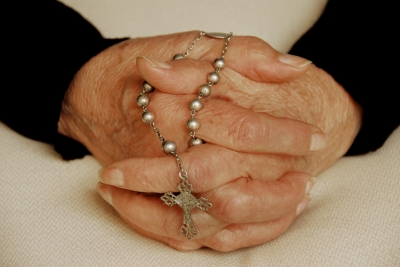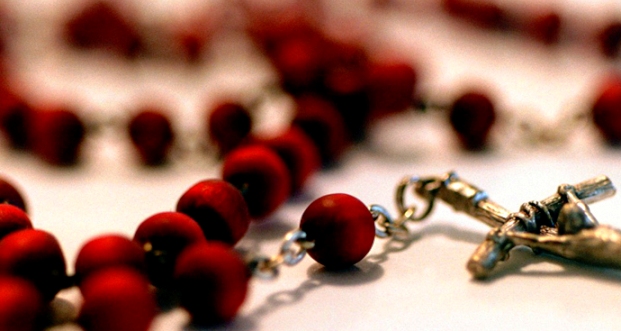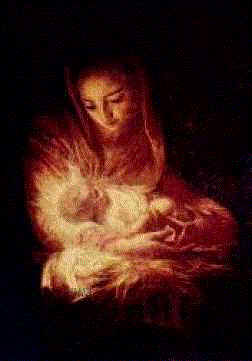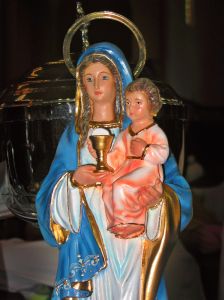The Secret Of The Rosary – Second Decade – Part 2


(St. Louis Marie de Montfort)
{play}images/stories/audio/The secret of the Rosary – decade 2-2.mp3{/play}
Sixteenth Rose
Even though there is nothing so great as the majesty of God and nothing so low as man in so far as he is a sinner, Almighty God does not despise our poor prayers. On the contrary, he is pleased when we sing his praises.
And the Angel’s greeting to our Lady is one of the most beautiful hymns which we could possibly sing to the glory of the Most High. “To you will I sing a new song” (Ps. 143:9). This new hymn, which David foretold would be sung at the coming of the Messiah, is none other than the Angelic Salutation.
There is an old hymn and a new hymn: the first is that which the Jews sang out of gratitude to God for creating them and maintaining them in existence, for delivering them from captivity and leading them safely through the Red Sea, for giving them manna to eat, and for all his other blessings.
The new hymn is that which Christians sing in thanksgiving for the graces of the Incarnation and the Redemption. As these marvels were brought about by the Angelic Salutation, so also do we repeat the same salutation to thank the most Blessed Trinity for the immeasurable goodness shown to us.
We praise God the Father because he so loved the world that he gave us his only Son as our Saviour. We bless the Son because he deigned to leave heaven and come down upon earth, because he was made man and redeemed us. We glorify the Holy Spirit because he formed our Lord’s pure body in the womb of our Lady, that body which was the victim for our sins. In this spirit of deep thankfulness should we, then, always say the Hail Mary, making acts of faith, hope, love and thanksgiving for the priceless gift of salvation.
Although this new hymn is in praise of the Mother of God and is sung directly to her, it is nevertheless most glorious to the Blessed Trinity, for any honour we pay to our Lady returns inevitably to God, the source of all her perfections and virtues. God the Father is glorified when we honour the most perfect of his creatures; God the Son is glorified when we praise his most pure Mother; the Holy Spirit is glorified when we are lost in admiration at the graces with which he has filled his spouse.
When we praise and bless our Lady by saying the Angelic Salutation, she always refers these praises to God in the same way as she did when she was praised by St. Elizabeth. The latter blessed her in her high dignity as Mother of God and our Lady immediately returned these praises to God in her beautiful Magnificat.
Just as the Angelic Salutation gave glory to the Blessed Trinity, it is also the very highest praise that we can give to Mary.
One day, when St. Mechtilde was praying and was trying to think of some way in which she could express her love of the Blessed Virgin better than before, she fell into ecstasy. Our Lady appeared to her with the Angelic Salutation written in letters of gold upon her breast and said to her, “My daughter, I want you to know that no one can please me more than by saying the greeting which the most adorable Trinity presented to me and by which I was raised to the dignity of the Mother of God.
By the word “Ave,” which is the name of Eve, Eva, I learned that God in his infinite power had preserved me from all sin and its attendant misery which the first woman had been subject to.
The name “Mary,” which means “lady of light,” shows that God has filled me with wisdom and light, like a shining star, to light up heaven and earth.
The words, “Full of grace,” remind me that the Holy Spirit has showered so many graces upon me that I am able to give these graces in abundance to those who ask for them through my mediation.
When people say, “The Lord is with thee,” they renew the indescribable joy that was mine when the eternal Word became incarnate in my womb.
When you say to me, “Blessed art thou among women,” I praise the mercy of God who has raised me to this exalted degree of happiness.
And at the words, “Blessed is the fruit of thy womb, Jesus,” the whole of heaven rejoices with me to see my Son Jesus adored and glorified for having saved mankind.”
Seventeenth Rose
Blessed Alan de la Roche, who was so deeply devoted to the Blessed Virgin, had many revelations from her, and we know that he confirmed the truth of these revelations by a solemn oath. Three of them stand out with special emphasis: the first, that if people fail to say the Hail Mary, which has saved the world, out of carelessness, or because they are lukewarm, or because they hate it, this is an indication that they will probably be condemned to eternal punishment.
The second truth is that those who love this divine salutation bear the very special stamp of predestination.
The third is that those to whom God has given this favour of loving our Lady and of serving her out of love must take very great care to continue to love and serve her until the time when she shall have had them placed in heaven by her Son in the degree of glory which they have earned (Blessed Alan).
Heretics, all of whom are children of the devil and who clearly bear the sign of God’s reprobation, have a horror of the Hail Mary. They still say the Our Father, but never the Hail Mary; they would rather carry a poisonous snake about them than a rosary.
Among Catholics, those who bear the mark of God’s reprobation think but little of the Rosary. They either neglect to say it or only say it quickly and in a lukewarm manner.
Even if I did not believe what was revealed to Blessed Alan de la Roche, even then my own experience would be enough to convince me of this terrible but consoling truth. I do not know, nor do I see clearly, how it can be that a devotion which seems to be so small can be the infallible sign of eternal salvation, and how its absence can be the sign of God’s eternal displeasure; nevertheless, nothing could be more true.
In our own day we see that people who hold new doctrines that have been condemned by the Church, with all their would-be piety, ignore the devotion to the Rosary and often dissuade their acquaintances from saying it with all sorts of fine pretexts. They are very careful not to condemn the Rosary and the Scapular, as the Calvinists do, but the way they set about attacking them is all the more deadly because it is the more cunning. I shall refer to it again later on.
The Hail Mary, the Rosary, is the prayer and the infallible touchstone by which I can tell those who are led by the Spirit of God from those who are deceived by the devil. I have known souls who seemed to soar like eagles to the heights by their sublime contemplation and yet were pitifully led astray by the devil. I only found out how wrong they were when I learned that they scorned the Hail Mary and the Rosary, which they considered as being far beneath them.
The Hail Mary is a blessed dew that falls from heaven upon the souls of the predestinate. It gives them a marvellous spiritual fertility so that they can grow in all virtues. The more the garden of the soul is watered by this prayer, the more enlightened in mind we become, the more zealous in heart, the stronger against all our enemies.
The Hail Mary is a sharp and flaming shaft which, joined to the Word of God, gives the preacher the strength to pierce, move, and convert the most hardened hearts, even if he has little or no natural gift for preaching.
As I have already said, this was the great secret that our Lady taught St. Dominic and Blessed Alan for the conversion of heretics and sinners. Saint Antoninus tells us that that is why many priests acquired the habit of saying a Hail Mary at the beginning of their sermons.
Eighteenth Rose
This heavenly salutation draws down upon us the blessings of Jesus and Mary in abundance, for it is an infallible truth that Jesus and Mary reward in a marvellous way those who glorify them. “I love those who love me. I enrich them and fill their treasures” (Prov. 8:17, 21). That is what Jesus and Mary say to us. “Those who sow blessings will also reap blessings” (2 Cor. 9:6).
Now if we say the Hail Mary properly, is not that a way to love, bless and glorify Jesus and Mary? In each Hail Mary we bless both Jesus and Mary: “Blessed art thou among women, and blessed is the fruit of thy womb, Jesus.”
By each Hail Mary we give our Lady the same honour that God gave her when he sent the archangel Gabriel to greet her for him. How could anyone possibly think that Jesus and Mary, who often do good to those who curse them, could ever curse those who bless and honour them by the Hail Mary?
Both Saint Bernard and Saint Bonaventure say that the Queen of Heaven is certainly no less grateful and good than gracious and well-mannered people of this world. Just as she excels in all other perfections, she surpasses us all in the virtue of gratitude; so she will never let us honour her with respect without repaying us a hundredfold. Saint Bonaventure says that Mary will greet us with grace if we greet her with the Hail Mary.
Who could possibly understand the graces and blessings which the greeting and tender regard of the Virgin Mary effect in us? From the very first instant that Saint Elizabeth heard the greeting given her by the Mother of God, she was filled with the Holy Spirit and the child in her womb leaped for joy. If we make ourselves worthy of the greeting and blessing of our Lady, we shall certainly be filled with graces and a flood of spiritual consolations will flow into our souls.
Nineteenth Rose
It is written, “Give, and it shall be given to you” (Lk. 6:38). To take Blessed Alan’s illustration of this: “Supposing I were to give you a hundred and fifty diamonds every day, even if you were an enemy of mine, would you not forgive me? Would you not treat me as a friend and give me all the graces that you were able to give? If you want to gain the riches of grace and of glory, salute the Blessed Virgin, honour your good Mother.”
“He who honours his Mother (the Blessed Virgin) is as one who lays up a treasure” (Sir. 3:5). Present her every day with at least fifty Hail Marys, for each one is worth fifteen precious stones, which are more pleasing to her than all the riches of this world put together.
And you can then expect great things from her generosity. She is our Mother and our friend. She is the empress of the universe and loves us more than all the mothers and queens of the world have ever loved any one human being, for, as St. Augustine says, the charity of the Blessed Virgin far surpasses the natural love of all mankind and even of all the angels.
One day Saint Gertrude had a vision of our Lord counting gold coins. She summoned the courage to ask him what he was doing, and he answered, “I am counting the Hail Marys that you have said; this is the money with which you purchase heaven.”
The holy and learned Jesuit, Father Suarez, was so deeply aware of the value of the Angelic Salutation that he said he would gladly give all his learning for the price of one Hail Mary well said.
Blessed Alan de la Roche said, “Let everyone who loves you, O most holy Mary, listen to this and drink it in:
Whenever I say “Hail, Mary,” the court of heaven rejoices and earth is lost in wonderment; I despise the world and my heart is filled with the love of God, when I say “Hail, Mary.” All my fears wilt and die and my passions are quelled, if I say “Hail, Mary;” devotion grows within me and sorrow for sin awakens, when I say “Hail, Mary.”
Hope is made strong in my breast and the dew of consolation falls on my soul more and more, because I say, “Hail, Mary.” And my spirit rejoices and sorrow fades away, when I say “Hail, Mary.”
For the sweetness of this blessed salutation is so great that there are no words to explain it adequately, and even when its wonders have been sung, we still find it so full of mystery and so profound that its depths can never be plumbed. It has but few words but is exceeding rich in mystery; it is sweeter than honey and more precious than gold. We should often meditate on it in our hearts, and have it ever on our lips so as to say it devoutly again and again.”
Blessed Alan also relates that a nun who had always had a great devotion to the Rosary appeared after her death to one of her sisters in religion and said to her, “If I were able to return in my body to have the chance of saying just a single Hail Mary, even without great fervour, I would gladly go through the sufferings that I had during my last illness all over again, in order to gain the merit of this prayer.” It is to be noted that she had been bedridden and suffered agonizing pains for several years before she died.
Michel de Lisle, Bishop of Salubre, who was a disciple and co-worker of Blessed Alan de la Roche in the re-establishment of the holy Rosary, said that the Angelic Salutation is the remedy for all ills that we suffer as long as we say it devoutly in honour of our Lady.
Twentieth Rose
Brief explanation of the Hail Mary
Are you in the miserable state of sin? Then call on Mary and say to her, “Ave,” which means “I greet thee with the most profound respect, thou who art without sin,” and she will deliver you from the evil of your sins.
Are you groping in the darkness of ignorance and error? Go to Mary and say to her, “Hail Mary,” which means “Hail, thou who art bathed in the light of the Sun of Justice,” and she will give you a share in her light.
Have you strayed from the path leading to heaven? Then call on Mary, for her name means “Star of the Sea, the Polar Star which guides the ships of our souls during the voyage of this life,” and she will guide you to the harbour of eternal salvation.
Are you in sorrow? Turn to Mary, for her name means also “Sea of Bitterness which has been filled with bitterness in this world but which is now turned into a sea of purest joy in heaven,” and she will turn your sorrow into joy and your affliction into consolation.
Have you lost the state of grace? Praise and honour the numberless graces with which God has filled the Blessed Virgin and say to her, “Thou art full of grace” and filled with all the gifts of the Holy Spirit, and she will give you some of these graces.
Are you alone, having lost God’s protection? Pray to Mary and say, “The Lord is with thee,” in a nobler and more intimate way than he is with the saints and the just, because thou art one with him. He is thy Son and his flesh is thy flesh; thou art united to the Lord because of thy perfect likeness to him and by your mutual love, for thou art his Mother. And then say to her, “The three persons of the Godhead are with thee because thou art the Temple of the Blessed Trinity,” and she will place you once more under the protection and care of God.
Have you become an outcast and been accursed by God? Then say to our Lady, “Blessed art thou above all women” and above all nations by thy purity and fertility; thou hast turned God’s maledictions into blessings for us. She will bless you.
Do you hunger for the bread of grace and the bread of life? Draw near to her who bore the living Bread which came down from heaven, and say to her, “Blessed be the fruit of thy womb,” whom thou hast conceived without the slightest loss to thy virginity, whom thou didst carry without discomfort and brought forth without pain. Blessed be “Jesus” who redeemed our suffering world when we were in the bondage of sin, who has healed the world of its sickness, who has raised the dead to life, brought home the banished, restored sinners to grace, and saved men from damnation. Without doubt, your soul will be filled with the bread of grace in this life and of eternal glory in the next. Amen.
Conclude your prayer with the Church and say, “Holy Mary,” holy because of thy incomparable and eternal devotion to the service of God, holy in thy great rank as Mother of God, who has endowed thee with eminent holiness, in keeping with this great dignity.
“Mother of God,” and our Mother, our Advocate and Mediatrix, Treasurer and Dispenser of God’s graces, obtain for us the prompt forgiveness of our sins and grant that we may be reconciled with the divine majesty.
“Pray for us sinners,” thou who art always filled with compassion for those in need, who never despise sinners or turn them away, for without them you would never have been Mother of the Redeemer.
“Pray for us now,” during this short life, so fraught with sorrow and uncertainty; now, because we can be sure of nothing except the present moment; now that we are surrounded and attacked night and day by powerful and ruthless enemies.
“And at the hour of our death,” so terrible and full of danger, when our strength is waning and our spirits are sinking, and our souls and bodies are worn out with fear and pain; at the hour of our death when the devil is working with might and main to ensnare us and cast us into perdition; at that hour when our lot will be decided forever and ever, heaven or hell.
Come to the help of your poor children, gentle Mother of pity, Advocate and Refuge of sinners, at the hour of our death drive far from us our bitter enemies, the devils, our accusers, whose frightful presence fills us with dread. Light our path through the valley of the shadow of death. Lead us to thy Son’s judgment-seat and remain at our side. Intercede for us and ask thy Son to pardon us and receive us into the ranks of thy elect in the realms of everlasting glory. “Amen.”
No one could help admiring the excellence of the holy Rosary, made up as it is of these two divine parts: the Lord’s Prayer and the Angelic Salutation. How could there be any prayers more pleasing to God and to the Blessed Virgin, or any that are easier, more precious, or more helpful than these two prayers? We should always have them in our hearts and on our lips to honour the most Blessed Trinity, Jesus Christ our Saviour and his most holy Mother.
In addition, at the end of each decade it is good to add the Gloria Patri, that is: “Glory be to the Father, and to the Son, and to the Holy Spirit. As it was in the beginning, is now, and ever shall be, world without end. Amen.”






